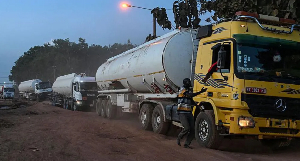Kwame Koduah Atuahene *
The usual Ghanaian attitude to disasters has been at its peak in recent weeks with the rise of road traffic crashes (accidents). Our sense of concern is only active when the newspapers scream the poignant headlines such as “15 persons killed on the Kumasi Accra-road”, we retire on the issue with the day’s work until the next screamer hits the newsstand.
The attitude of the Ghanaian media on crashes is generally reactionary and rarely proactive. Media content is predominantly partisan politics with little or no devotion to such a development issue that leads to the loss of 1.6% of the GDP (estimated at US$288million in 2009 by the National Road Safety Commission-NRSC)
The press has a significant contribution to this shared responsibility to make our roads safe. One issue not interrogated enough in my view is the extent of commitment demonstrated by successive governments to deliver on the national vision to make Ghana’s road transportation systems the safest in Africa
In this country, politicians jostle for attention on their achievement as regards the stretch of roads constructed during their tenure without focusing on how much lives get killed on these roads though about 70% of all crashes occur on flat and straight roads, presumably the good and new roads (source: NRSC).
Indeed, governments’ investment and commitment to road safety in this country has been insignificant. From the engineering perspective, safety units are the first to suffer budget cuts while budget for the NRSC continue to plummet with the Police MTTU counting on the sheer benevolence of others to procure basic enforcement devices such as alcoholmeters, speed radar guns and the likes.
Though the Road Traffic Act, was enacted in 2004, governments since have conveniently reviewed the penalty regime of this law whittling down the deterring consequence of this law and never shown any commitment to pass the consequential Legislative Instrument that has been pending since 2006.
Between 2006 and 2010, an estimated 10,000 Ghanaians have lost their lives through road crashes and think that, successive government must assume as much share of the blame for this national disaster for their failure to act on the passage of the Road Traffic Regulations which seeks to address some critical safety issues. I have elected to discuss some of the reasons politicians must act swiftly on this pending legislation.
Regulating the Transport Industry In this country, the road transport industry remains unregulated with easy entry routes characterized by incompetent drivers, unworthy commercial vehicles and near unavailable institutional control mechanisms to ensure better safety standards from transport operators.
Sadly, commercial vehicles are able to provide public transport service without belonging to any union to allow for any regulation of their service for the public good.
The effect is that, about 23% of all crash victims according to the NRSC are patrons of commercial mini-buses obviously for the poor or non-existing standards
To cure this phenomenon, the pending Road Traffic Regulations (RTR) proposes that, all commercial drivers must belong to a transport union. These transport unions and organizations will be licensed to provide public transport service based some stringent safety guidelines. The permits expected to be renewed annually will enhance service delivery and safety standards and safety of patrons of public service vehicles.
Introducing Commercial Vehicle Driving Permit Driving commercial or public service vehicles come with an additional responsibility on the point of safety. Many a time this is taken for granted and as a result it has been proposed that, a driver of a commercial vehicle shall have in addition to the driving license, a commercial vehicle driving permit which shall be renewed annually upon satisfying some conditions which includes at least a road safety refresher training.
In this country, most commercial drivers do not value refresher training. The number of drivers chasing commercial driving opportunities is such that commercial drivers are at pains to sacrifice their jobs for training especially when training is no priority to the vehicle owners who own the investment or the transport unions who manage their investment.
The law expects to raise the profile of commercial drivers significantly as a result of the renewal of commercial vehicle driving permits annually which is conditioned on proof of at least one approved road safety refresher training
Prohibition of use of motor cycle or tricycle for Commercial purpose.
The issue of “okada” has been played onto the front burner in recent times with a pronounced position of dislike for the service. Except that the current Road Traffic Act arguably doesn’t define commercial vehicles to include motor cycles, the clearest legal annulment of this service sits in this pending legislation and none else.
The proposal is that, No motor cycle or tri-cycle shall be registered to carry any fare paying Passengers. A person shall not use, cause or permit to be used a motor cycle or tri-cycle for Commercial purposes and that whosoever contravenes this law commits an offence liable on summary conviction to a fine not exceeding twenty-five (25) penalty units or to a term of imprisonment not exceeding thirty (30) days or both.
Prohibiting the Conversion of Goods carrying vehicles for Passenger purposes.
In Ghana, a significant portion of the passenger carrying vehicles are imported as cargo with their conversion failing to meet the requisite standard. This tends to compound the severity of injuries when crashes occur due to the sub-standard materials often used.
To cure this phenomenon, this pending legislation, after careful thought through proposes to outlaw such conversions so that, only vehicles originally manufactured for passenger carrying purposes will be allowed for that purpose on our roads. This will significantly address the concerns of standards related to the 207 buses and their kind which has remained an albatross for ages.
Improving Vehicle Conspicuity After nearly fifty-four (54) years of our existence, the Accra-Tema motorway which is one show piece of a road has struggled to be lighted. Ghana generally has visibility concerns especially at night derailing the cardinal road safety principle of “see and be seen”
This legislation, consistent with best practices proposes that all vehicles (passenger and goods) with a gross weight of about 3.50 tonnes shall be fitted on the sides and the rear of the vehicle with approved retro-reflectors to improve significantly the visibility deficit that scares us at night.
This together with a religious enforcement of the use of the double function advance warning triangle will render the ban on heavy goods vehicles on our roads between 6am and 6pm an unnecessary measure for the 21st century.
Controlling speeds mechanically. It is a notorious fact that high speeds account for about sixty (60%) of all crashes in Ghana yet we have turned a blind eye on very forceful proposal meant to manage such a killer instinct inherent in many a Ghanaian driver.
Currently, but for the few engineering prescriptions such as the speed tables, rumble strips, speed rumps among others provided by our road engineers to compel lower speeds, drivers have flouted with impunity the ubiquitous speed limits posted on most of our roads.
In addition to police efforts, this legislation, proposes the fitting of speed limiters in all commercial vehicles. The speed limiter is a device that limits the speed of the vehicle to a pre-determined speed limit.
This device will at least ensure that commercial vehicles which are public service vehicles comply with the maximum speed permissible on our highways which is 80km per hour and 100 kmph for the motorway.
Prohibition on use of communication device while driving Research has proven that it is three times riskier to drive while on the phone than to drive drunk. There has been a recent innovative effort by the police to enforce the offence of careless and inconsiderate driving which is a major traffic offence under the Road Traffic Act 687, 2004, relying on the obvious inconsiderate road use attitude of using mobile phone while driving.
In strict sense however, the law prohibiting the use of phone while driving is still pending. It proposes that, considering the concentration levels required driving as a competent driver, A person shall not drive a vehicle on a road while holding or operating a cellular or mobile telephone with one or both hands or with any other part of the body including a headgear or earphone.
So that, if we are concerned about managing this risk, then the road traffic regulation must see life.
Used Tyres and Road Crashes H. E. John Mahama, the Vice-president recently revisited the debate regarding the relationship between used tyres and crashes. The National Road Safety Commission as the lead statutory agency had long researched into this issue of the magnitude of the use of “home used tyres” in the country and its impact on road safety in Ghana.
It was found that some imported tyres are not road worthy as their service life has already expired. Most are labeled “Snow Tyres” which are not required to be used in the tropical environments like ours.
Again, purchase of used tyres in Ghana was found to be influenced largely by cost. On the average, the cost of a new tyre is six (6) times that of a used tyre.
It has subsequently been proposed in this pending legislation that, it will be illegal if a tyre fitted on any motor vehicle or trailer is more than four (4) years after date of manufacture and or it is labeled temperature class “C” and meant for use in cold areas in addition to the requirements as to size commensurate to permissible load of the vehicle among others.
Managing disabled or broken down vehicles and trailers The NRSC appreciates that about twenty percent (20%) of crashes are caused by disabled vehicles unattended to by their drivers and owners. The pending legislation proposes to deal with this menace with the private sector collaborating with the Police or Metropolitan, Municipal and District assemblies.
The proposal allows for a voluntary towing of such vehicles within a maximum waiting period of one hour and two hours for built-up areas and highway respectively. In the event owners fail, the vehicles will be towed and owners surcharged with the cost or vehicles auctioned after ninety days to recover cost. The duration permitted for voluntary compliance is however subject to public safety considerations.
The year has been rightly declared as an Action year. It is the fervent prayer of road safety advocates that this clarion call will resonate urgently with this pending piece of legislation. Cabinet must act swiftly to save the dwindling confidence in our road transport system. We cannot continue to sacrifice the lives of our friends, breadwinners and relatives on the altar of expectation. In this country motorist understand inspection and not expectation.
The Author is a Lawyer, a Member of the Technical Committee that worked on the pending Road Traffic Legislative Instrument & Communications Manager for National Road Safety Commission
Opinions of Thursday, 3 March 2011
Columnist: Atuahene, Kwame Koduah














